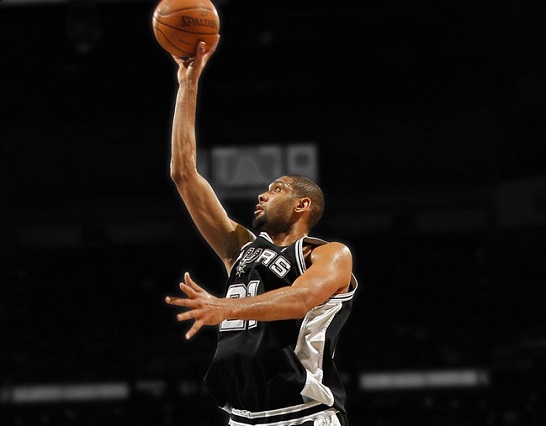Tim Duncan is the greatest power forward in the history of the National Basketball Association.
Yeah, I said it.
I know many people will disagree, but between the numbers, rings and overall consistency, no one has had the type of impact at the position that Duncan has.
In today's 24-hour information age, the media and fans alike are quick to declare someone the greatest without the proper prospective. However, after going back and studying Duncan's career as a whole over these past few weeks, as well as other great players from years past, I can't come up with anyone that's ever done it better.
 |
| Photo by: Getty Images |
Let me be clear; excellence is never boring. Duncan may not be a commercial darling, or the most athletic guy to ever lace up a pair of sneakers, but for 16 years he has been nothing short of a model of enduring brilliance.
A dominant force during his college days at Wake Forest, Duncan was the first overall pick in the 1997 draft. For the first 8 years of his career, he averaged at least 20 points, 11 rebounds and 2 blocks a game, while never slipping under 49% shooting from the field. His best season in that span was the 2001-2002 campaign, when he averaged 26 points, 13 rebounds and 3 blocks per while shooting 80% from the line and 51 % from the field en route to league MVP honors.
Another thing about Duncan that should be admired is his ability to rise to the occasion when the lights are brightest. His career playoff averages in points, rebounds, assists and blocks are all higher than his regular season averages, proving the true greats elevate their play in April, May and June.
The game that best defines Tim Duncan's illustrious career is Game 1 of the 2003 Finals versus the New Jersey Nets, when he exploded for 32 points, 20 rebounds, 7 blocks, 6 assists and 3 steals. Rarely is this individual performance mentioned in the same breath as Magic Johnson's Game 6 against the Philadelphia 76ers in 1980, or the countless heroics of Michael Jordan over the course of his postseason career, but it deserves the same type of praise.
In recent years, Duncan has quietly stepped aside and allowed the offense to flow more through Tony Parker and Manu Ginobili. He's never made a big deal about touches or minutes, and has continued to play at a high level. This transition began around the last year that San Antonio won the championship (2007), and it may not be a coincidence that the Spurs had failed to get back to the Finals prior to this season since Duncan's role in the offense diminished to an extent.
Perhaps the most underrated facet of Duncan's game revealed itself during this year's conference finals; his all-around defense and ability to alter shots. Taking turns guarding the rough and tumble duo of Zach Randolph and Marc Gasol, Duncan helped limit the pair to a combined 33.5 % shooting from the field, a number that stood at 47.7% during the regular season. It was evident throughout the series that Randolph and Gasol were bothered by the length and quickness of Duncan around the rim.
In order for San Antonio to upset the Miami Heat, Tony Parker will have to continue to shred defenses, Tiago Splitter will have to crash the boards, and Manu Ginobili and Kawhi Leonard will have to provide consistent scoring from the outside. But make no mistake about it, the key to the series is Tim Duncan. If he patrols the paint with a solid defensive effort and makes a conscientious effort to run the floor and set up easy baskets, No. 21 could be picking up ring No. 5.
Still think the topic of 'greatest power forward in the history of the game' is debatable?

Nice post.
ReplyDeletehe one of them for sure,the best i can't say!! not much difference in the top five!!
ReplyDeleteI think its hard to say "greatest in history" for anyone...but he sure is right up there.
ReplyDeleteKarl Malone was better.
ReplyDeleteThe best when he's had a great supporting cast around him his entire career? I don't think so.
ReplyDelete